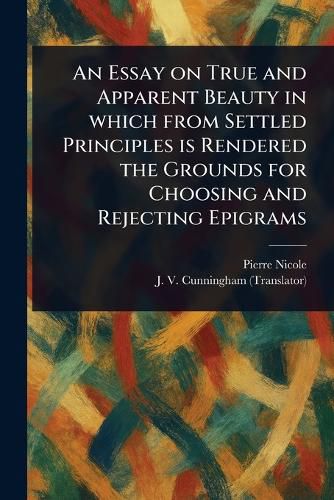Readings Newsletter
Become a Readings Member to make your shopping experience even easier.
Sign in or sign up for free!
You’re not far away from qualifying for FREE standard shipping within Australia
You’ve qualified for FREE standard shipping within Australia
The cart is loading…






This title is printed to order. This book may have been self-published. If so, we cannot guarantee the quality of the content. In the main most books will have gone through the editing process however some may not. We therefore suggest that you be aware of this before ordering this book. If in doubt check either the author or publisher’s details as we are unable to accept any returns unless they are faulty. Please contact us if you have any questions.
Explore the nature of beauty and literary judgment in Pierre Nicole's "An Essay on True and Apparent Beauty in which from Settled Principles is Rendered the Grounds for Choosing and Rejecting Epigrams." This meticulously prepared edition presents Nicole's incisive literary criticism, focusing on the art of the epigram and the broader principles of aesthetics.
A significant contribution to the field of French literature and poetic analysis, this essay delves into the criteria for discerning true beauty from mere superficial charm in writing. Nicole's work offers a historical perspective on the evaluation of literary works, particularly poetry, and examines the philosophical underpinnings of aesthetic preference. Discover the timeless relevance of Nicole's insights as he explores the foundations for appreciating and critiquing artistic expression. A valuable resource for scholars and anyone interested in the history of literary theory and the enduring power of beauty in art.
This work has been selected by scholars as being culturally important, and is part of the knowledge base of civilization as we know it.
This work is in the public domain in the United States of America, and possibly other nations. Within the United States, you may freely copy and distribute this work, as no entity (individual or corporate) has a copyright on the body of the work.
Scholars believe, and we concur, that this work is important enough to be preserved, reproduced, and made generally available to the public. We appreciate your support of the preservation process, and thank you for being an important part of keeping this knowledge alive and relevant.
$9.00 standard shipping within Australia
FREE standard shipping within Australia for orders over $100.00
Express & International shipping calculated at checkout
Stock availability can be subject to change without notice. We recommend calling the shop or contacting our online team to check availability of low stock items. Please see our Shopping Online page for more details.
This title is printed to order. This book may have been self-published. If so, we cannot guarantee the quality of the content. In the main most books will have gone through the editing process however some may not. We therefore suggest that you be aware of this before ordering this book. If in doubt check either the author or publisher’s details as we are unable to accept any returns unless they are faulty. Please contact us if you have any questions.
Explore the nature of beauty and literary judgment in Pierre Nicole's "An Essay on True and Apparent Beauty in which from Settled Principles is Rendered the Grounds for Choosing and Rejecting Epigrams." This meticulously prepared edition presents Nicole's incisive literary criticism, focusing on the art of the epigram and the broader principles of aesthetics.
A significant contribution to the field of French literature and poetic analysis, this essay delves into the criteria for discerning true beauty from mere superficial charm in writing. Nicole's work offers a historical perspective on the evaluation of literary works, particularly poetry, and examines the philosophical underpinnings of aesthetic preference. Discover the timeless relevance of Nicole's insights as he explores the foundations for appreciating and critiquing artistic expression. A valuable resource for scholars and anyone interested in the history of literary theory and the enduring power of beauty in art.
This work has been selected by scholars as being culturally important, and is part of the knowledge base of civilization as we know it.
This work is in the public domain in the United States of America, and possibly other nations. Within the United States, you may freely copy and distribute this work, as no entity (individual or corporate) has a copyright on the body of the work.
Scholars believe, and we concur, that this work is important enough to be preserved, reproduced, and made generally available to the public. We appreciate your support of the preservation process, and thank you for being an important part of keeping this knowledge alive and relevant.